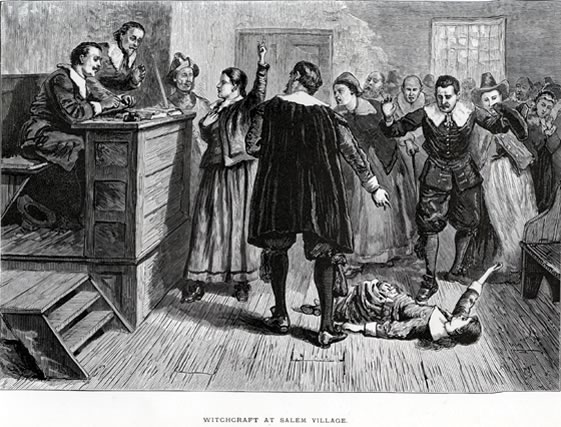The Puritans changed an accepted version of the psalms for
the use of praising the Lord in hymns. Their new version of the book of psalms
underwent changes in the gate/meter and also the translations were a bit
different, giving a slightly different meaning to its readers. If this was not
common for churches and other sub groups of religion, then why was this done upon
the Puritans coming to America, and what effect did it have on the Puritan’s
outlook on religion and life in general? Could this new religious outlook have
started the Salem Witch Trials?
For one, the Puritans left England seeking religious freedoms, upon their arrival to the Americas in the early 1600’s, they quickly adopted their newly reformed religion. Puritan teachings were very strict in code, very little was tolerated. It was against the law to not attend church, where in church, men and women were obligated to sit on opposite sides as each other. Their lives outside of church were firm and restrained and believed all sinners should be punished for their sinful behaviors. The Devil was heavily believed in, they believed Satan would force individuals to carry out his work, for the individuals who carried out these deeds were considered witches. And for being a witch, you were persecuted with death. As one can clearly see in The Bay Psalm Book, sinners and non-believers where highly looked down upon and thought of as opponents to the believers. The puritan translation of the psalms had a detrimental effect on life and religion; uniformity was created in the puritan society, but it was their repressive ways of uniformity that caused their downfall.
For one, the Puritans left England seeking religious freedoms, upon their arrival to the Americas in the early 1600’s, they quickly adopted their newly reformed religion. Puritan teachings were very strict in code, very little was tolerated. It was against the law to not attend church, where in church, men and women were obligated to sit on opposite sides as each other. Their lives outside of church were firm and restrained and believed all sinners should be punished for their sinful behaviors. The Devil was heavily believed in, they believed Satan would force individuals to carry out his work, for the individuals who carried out these deeds were considered witches. And for being a witch, you were persecuted with death. As one can clearly see in The Bay Psalm Book, sinners and non-believers where highly looked down upon and thought of as opponents to the believers. The puritan translation of the psalms had a detrimental effect on life and religion; uniformity was created in the puritan society, but it was their repressive ways of uniformity that caused their downfall.


